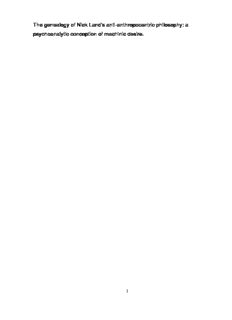
The genealogy of Nick Land's anti-anthropocentric philosophy PDF
Preview The genealogy of Nick Land's anti-anthropocentric philosophy
The genealogy of Nick Land's anti-anthropocentric philosophy: a psychoanalytic conception of machinic desire. 1 2 The genealogy of Nick Land's anti-anthropocentric philosophy: a psychoanalytic conception of machinic desire. Stephen Overy Submitted in fulfilment of the degree Doctor of Philosophy Philosophical Studies, University of Newcastle July 2015 3 4 Abstract In recent years the philosophical texts of Nick Land have begun to attract increasing attention, yet no systematic treatment of his work exists. This thesis considers one significant and distinctive aspect of Land's work: his use of a psychoanalytic vocabulary, which is deployed to try and avoid several problems associated with metaphysical discourse. Land's larger project of responding to the Kantian settlement in philosophy is sketched in the introduction, as is his avowed distaste for thought which is conditioned by anthropocentricism. This thesis then goes on to provide a genealogical reading of the concepts which Land will borrow from psychoanalytic discourse, tracing the history of drive and desire in the major psychoanalytic thinkers of the twentieth century. Chapter one considers Freud, his model of the unconscious, and the extent to which it is anthropocentric. Chapter two contrasts Freud's materialism to Lacan's idealism. Chapter three returns to materialism, as depicted by Deleuze and Guattari in Anti-Oedipus. This chapter also goes on to consider the implications of their 'schizoanalysis', and contrasts 'left' and 'right' interpretations of Deleuze, showing how they have appropriated his work. Chapter four considers Lyotard's works from his 'libidinal period' of the late sixties to early seventies. These four readings, and the various theories of drive and desire they contain, are then contextualised in relation to Land's work in chapter five. This final chapter considers Land's theory of 'machinic-desire', and evaluates if his construction of the concept, via psychoanalysis, offers a superior approach to anti-anthropocentric positions constructed in metaphysics. The role of psychoanalytic thought in constructing Land's cosmological theory of thermodynamic entropy and extropy is also considered. 5 Acknowledgements Thanks to my parents, grandparents, and Heather, without whose support this thesis would not have been possible. Thanks to the staff of Philosophical Studies at Newcastle University, who have allowed me the space to peruse this line of research. I especially thank my supervisor Lars Iyer, who has borne my various periods of enthusiasm and indolence with good humour, and has helped me to craft this thesis into its present form. I would also like to thank Kenneth Smith and Joris De Henau for their help reading though various drafts, particularly Joris' ability to spot a missed diacritic with almost perfect accuracy. 6 7 Contents 0. Introduction 13 14 ◦ The Philosopher of the Outside 24 ◦ A Philosopher Without Friends? 30 ◦ The Metaphysical and the Psychoanalytic 40 ◦ Outline of the Thesis 44 ◦ The Trap of Anthropocentricism 47 ◦ Anti-Anthropocentricism and Anti-Academism 1. Freud: the Constitution of the Unconscious 51 55 ◦ Discovery and Populations 71 ◦ Topographies 75 ◦ Processes: Instinct, Drive, Desire 96 ◦ Anthropocentricism and the Death Drive 107 ◦ Conclusions 2. Lacan's Return to Freud 109 111 ◦ Objectives 114 ◦ Structural linguistics: Metaphor and Metonymy 130 ◦ Lacanian Desire 8 139 ◦ The Lacanian Drive 144 ◦ Lacanianism 3. Deleuze and Guattari's Anti-Oedipus: A Theory of the 149 Productive Unconscious 152 ◦ The authors' Intended Purpose of Anti-Oedipus 165 ◦ The Dangers of Oedipus 177 ◦ Schizo-Desire is Materialist Psychoanalysis 184 ◦ The Implications of Materialist Psychology: Deleuze and the Virtual, Desire, and Difference 201 ◦ The Left Deleuzian and Right Deleuzian Positions. 208 ◦ Reconciling Deleuze-Guattari with Freud-Lacan: Desire, Desiring Machines, Drives, Assemblages. 4. Lyotard: Towards a Libidinal Economics 218 221 ◦ The 'Figure' 225 ◦ The 'Libidinal Period' 231 ◦ Key Readings 238 ◦ Libidinal Economy 249 ◦ The Death Drive Revisited 252 ◦ Summary: Emma and Drive Theory 9 5. Land: Machinic Desire 256 256 ◦ Wintermute and Neuromancer 264 ◦ Land's Philosophical Project: Encoulage 272 ◦ The Drive Economy on the Edge of the Subject 282 ◦ The Desire Economy of Objects 289 ◦ Deploying Libidinal Materialism 294 ◦ Critique of Land at Accelerate 301 ◦ What is Left for Philosophy? 305 ◦ Bibliography 10
Description: